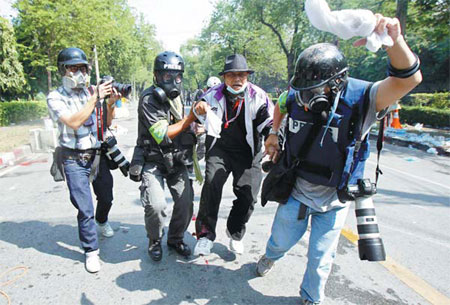'Open every door' for peace: Thai PM
Police use rubber bullets, tear gas to disperse more violent protesters
Thai Prime Minister Yingluck Shinawatra said on Monday she would "open every door" to find a peaceful solution to the current political crisis, as thousands of protesters took to the streets of Bangkok seeking to topple her government.
She told a news conference that police would not use force against the protesters. But later, the national security chief said rubber bullets were being used as protesters threatened to advance to Yingluck's office, the focal point of the demonstrations since the weekend.
The United Nations closed its main office in Bangkok, dozens of schools were shut and civil servants skipped work as stone-throwing protesters battled through clouds of tear gas in renewed assaults on key government buildings on Monday.
The violence is the latest twist in a conflict pitting Bangkok's middle class and royalist elite against the mostly poor, rural supporters of Yingluck and her brother, Thaksin Shinawatra, a populist former prime minister who was ousted in a military coup in 2006 and lives in self-imposed exile in Dubai.
Witnesses said demonstrators had succeeded in taking down at least one outer layer of the concrete barriers set up by the authorities to defend Government House, Yingluck's office in the heart of Bangkok.
After using round upon round of tear gas on Sunday to repel the protesters, police stepped up their response on Monday.
"We are alternating between the use of water cannons, tear gas and rubber bullets. Rubber bullets are being used in one area only and that is the bridge near Government House," said Paradorn Pattanathabutr, the head of the National Security Council.
Tear gas was also used against protesters at the headquarters of the Bangkok metropolitan police.
Thai financial markets were weak on Monday, with the baht currency down against the dollar despite Bank of Thailand intervention to support it. It recovered slightly after Yingluck's comments on the protests.
The baht has fallen 3 percent since early November and the benchmark stock index has lost 5.8 percent in the past month.
The cost of insuring exposure to Thai government debt via credit default swaps has also crept up in recent weeks.
The protests have been joined by the opposition Democrats, Thailand's oldest political party. It has not won an election in more than two decades and has lost every national vote for the past 13 years to Thaksin or his allies.
Suthep Thaugsuban, 64, was a deputy prime minister in the Democrat-led government that lost power to Yingluck in a 2011 election. He wants a vaguely defined "people's council" to replace her government and for a parliament made up of nominated worthies.
"The protesters' demands are impossible to meet under the framework of the constitution," Yingluck told the news conference. Suthep has set a Tuesday deadline for her to step aside and his movement has called for civil servants to go on strike.
Reuters-AP
|
Photographers help an injured protester after clashes broke out with the riot police near the Government House in Bangkok on Monday. Chaiwat Subprasom / Reuters |
(China Daily 12/03/2013 page12)













